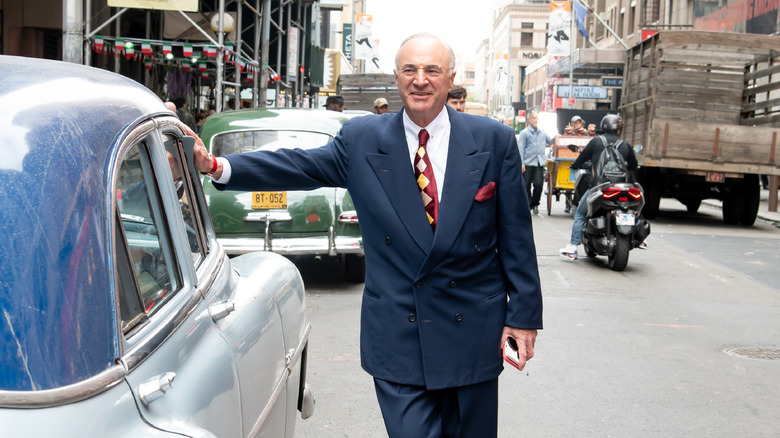Kevin O'Leary's Most Controversial Finance Advice Isn't For The Faint Of Heart
Mr. Wonderful is a fixture on the "Shark Tank" franchise. One of the most prominent personalities among the entrepreneurs sitting in a line to receive investment pitches on the American iteration of the show, Kevin O'Leary has carved out a unique position for himself. O'Leary frequently offers capital with caveats. He's a consistent seeker of dividends, in any form he can find them. Kevin O'Leary is outspoken, and even casual viewers of the show will know him as the brash voice of stark reason. He calls ideas stupid, suggests that some entrepreneurs that come in front of him and the other sharks are crazy or delusional, and at times he seems to almost take joy out of dumping on the financials that come along with a pitch. His directness feels off-putting the first time you watch him operate. But set against the guidance coming from others, the air of brusqueness melts a bit and the persona settles into something of a tough-love coaching figure.
O'Leary's abrupt advice doesn't end on the show, however. He's an outspoken guidance-giver beyond his time on the program, and many tidbits of wisdom he offers may just have the ability to change your trajectory. O'Leary is definitive in his approach to investing, business, and social relationships. Some of his advice isn't going to sit well with numerous readers and listeners, however. It's not all easy to stomach, but in his estimation, if you're able to find your way through a bit of discomfort you'll come out the other side in a much better position.
Don't spend your birthday money or earnings from a side hustle
One of Kevin O'Leary's most direct and often difficult pieces of advice for consumers to follow centers on money you might earn or receive beyond your typical paycheck. Whether it's money you're given in a birthday card from family or friends, cash you earn in a side hustle or even something like your tax refund, any money you have your bank account that might be considered extra should go right into your savings portfolio. O'Leary doesn't give himself or people taking his advice any leeway in this regard. You shouldn't use additional money coming into your budget to support routine spending needs or as a means to bridge the gap when taking on new obligations. Any money that feels additional to your primary stream of income should be treated separately.
On top of this special treatment, Kevin O'Leary is strong advocate for automatically saving 15% of your paycheck, at a minimum. He suggests on an average salary if you 15% throughout your working life you'll be virtually guaranteed to retire as a millionaire. Add in the extra money you receive from various gifts or additional income sources and that proposed end figure becomes significantly larger. This is certainly not an easy road to walk, but if you can adhere to a strict savings routine of this nature you'll set yourself up for solid financial stability.
You need $5 million in the bank, liquid
O'Leary talks consistently about saving to become a millionaire. In truth, the money you have set aside will almost certainly provide less financial support than you anticipate. Inflation is a constant enemy of those working with a fixed income and numerous complications that go hand in hand with a typical retirement lifestyle come into the picture to spoil your best laid plans. The average American today believes that a nest egg worth almost $1.5 million is required to retire comfortably. Kevin O'Leary goes a step further and puts the number that savers should be striving to hit at $5 million. He says that this is his minimum and if you aren't at this threshold — i.e., just about everyone — then you need to stop "buy[ing] sh*t you don't need."
His take on achieving this level of savings isn't just about building a war chest of assets. Instead, he focuses on the risk tolerance an investor should stomach. He notes that big and flashy investments shouldn't be a part of your saving conversation until you've hit this significantly large backstop. Of course, It's probably worth nothing that retirees aged 65 to 74 enjoy a median net worth of $410,000 (and an average of nearly $1.8 million). Therefore, you might want to treat this figure laid out by O'Leary as hyperbole rather than gospel. Even so, He has a point. Focusing on consistent, sound investments that will continue to grow your portfolio steadily over the long term should be your bread and butter throughout most of your retirement saving timeline.
Be in the habit of saying 'no'
Kevin O'Leary is a vocal participant in his role on "Shark Tank." He's constantly chiming in with questions, criticisms, and sometimes, praise. O'Leary might seem like a cynical investor, but this is actually a product of a different mindset. Rather than existing as a negative Nancy who is seemingly always out to spoil the party, he's a frugal spender who prioritizes discipline over emotional action. He's firmly in the habit of saying "no" to opportunities unless there's a valid, logical reason to change his mind. This helps him steer clear of risky investments that might otherwise win him over with a flashy sales pitch while lacking the actual substance to deliver. In this regard, he practices what he preaches.
In the routine consumer landscape, it's also important to be in the habit of declining. The marketplace has become exceedingly adept at parting consumers with their money. From the physical layout of grocery stores and online retailers to the tidal wave of ad content found in every corner of daily life, much of the activity you participate in as a consumer is geared toward convincing you to open your wallet. If you want to make big changes to your debt load, retirement savings volume, or emergency fund, often the most important alteration comes in a willingness to cut out splurge spending. Creating a habit of not spending isn't easy, but O'Leary suggests that it's the only way forward for those seeking to take charge of their financial life.
Don't retire until you can afford it
Kevin O'Leary speaks a lot about retirement and saving for it. He has personally been vocal about his own choice to never retire. However, his role in the working world is absolutely different from that of a typical employee. O'Leary is an investor whose daily grind involves research and business meetings rather than working heavy machinery, driving hundreds of miles, or teaching a classroom full of students. Similarly Kevin O'Leary could absolutely afford to retire at any time of his choosing, with an estimated net worth of about $400 million.
His advice for others on the question of retirement focuses not on age but instead on portfolio value and personal goals. He says that workers should plan to retire when they can afford it, not when they reach retirement age or some other, arbitrary number that feels appropriate. The average retiree in America today leaves the workforce at 62. You may be financially prepared for this transition at that time, but plenty of workers are not. There are numerous signs that can point you in the right direction here. If you are still managing ongoing credit card debts, supporting children or grandchildren financially, or haven't yet hit your savings targets, you are probably not ready to retire. There are a few guiding frameworks that can help you identify the amount you'll need to set aside. For instance, at 60 you'll want to shoot for twelve times your salary. Alternatively, it can be instructive to calculate the size of your annual budget and multiply that by 25 to arrive at a total savings goal.
Radically shed spending leading up to retirement
Many people will be familiar with the idea of redoubling efforts to save for retirement in the years leading up to this change. With the help of catch up contribution limits expanding after 50, many savers are already focusing on depositing more into their retirement accounts or plan to do so when they cross this age threshold. But planning to make something a priority and acting on that strategy are two separate things. Kevin O'Leary suggests radically shedding spending across the board in the years ahead of your planned retirement date. Essentially, he advocates for spending priorities akin to that of a hermit. You should limit eating out at restaurants — even more than usual, since this is one of the worst ways to waste your hard earned money — and forget about extravagant, or perhaps even basic vacation plans.
For the "Shark Tank" member these final years before this important lifestyle change should be laser focused on pouring cash into your investment accounts, essentially to the detriment of many other routine action items that would otherwise take up residence in your budget. This isn't going to go over well with many consumers, but if you are able to commit to a drastic shrinking of your expenditures your retirement finances will be exponentially more robust.
Then keep working in a part-time role
O'Leary also suggests another, complimentary approach to the transition. Instead of leaving the workforce and sliding into a leisurely retirement lifestyle, he suggests actively pursuing a part-time job right away. Many workers will balk at this idea, but continuing to draw a paycheck (even a small one) after you leave your working routine behind is actually beneficial for a few reasons. This can help limit the mental strain that comes from this difficult transition, and it will naturally bring continued stability to your finances. It's well-documented that simply halting your work schedule when you retire increases the likelihood of developing depression or other mental health issues. Therefore, remaining in the workforce but doing it on your own terms allows for an easier landing.
This also helps smooth out the financial changes. Drawing a portion of your retirement income from outside of your savings portfolio allows for greater capital preservation as the drawdown requirements to support your lifestyle are notably lighter. This can ultimately give your principal more time to grow, lengthening your nest egg in the process. Even a short supplement that lasts a year or two as you finalize your exit from the working life can make a huge difference in the value your savings portfolio brings to the table.
Give your kids what they need as they grow, but kick them out of the nest when the time comes
Kevin O'Leary looks back fondly on the memory of his mother in many interviews and public appearances. One of the most prominent quotes he recalls from her is a metaphor. At his graduation, she said to him "the dead bird under the nest never learned how to fly." She was kicking him out of the nest and making him learn to soar all on his own. The transition into adulthood is a trying and sometimes scary time. But O'Leary suggests that giving your children too much support in this phase can actually do more harm than good. He believes adamantly that wealthier individuals are often funded for too long and never learn how to fend for themselves or take calculated risks.
Of course, in order to send your children off into the world and expect them to be successful, you'll need to teach them financial literacy while they are still firmly under your wing. Among some of the more alarming financial stats that dominate the American public consciousness is the reality that only 17% of high school students are required to take financial literacy courses. Giving your children the tools they need to succeed goes hand in hand with sending them out on their own to achieve that success that both of you so desperately want.
Steer clear of safer waters in consulting jobs and similar landing spots
Many people go to school in pursuit of credentials that will help them land a great job with an excellent salary. It's true that more education tends to result in higher financial attainment, but the job you chase after with that great salary can actually become a hindrance to your personal growth if you aren't careful. Kevin O'Leary suggests taking a skeptical approach to many jobs that promise to pay you lucratively. Specifically, he worries about consulting jobs and other similar roles. "If you want to drift into hell on earth, he says, stay 24 months in a consulting firm and you are tainted meat for the rest of your life. No one's going to hire you to make a decision because you never have made one," he says.
Consulting, he suggested to Fortune, "suffers from a lack of accountability." Consultants are handsomely played analysts that spend all their time researching and looking for ways to streamline or improve processes. But they never really make decisions, and therefore never have to manage the cleanup of a bad one. They are a layer removed from responsibility and therefore don't have to learn from their mistakes. A huge starting salary today can feel like a great way generate financial stability for yourself, but O'Leary suggests building something of your own instead. Taking risks, engaging in exciting new opportunities, and owning successes and failures he suggests will yield a far more enriching career and the potential for greater financial returns over the long term, even if the benefits of a different route seem significant early on.
Stick to rigid diversification rules, even when the market rewards greater risk
Rigidity usually isn't the best approach when crafting your overarching investment or savings strategy. The market's dynamic nature means flexibility is often an important feature to build into your mindset. However, that doesn't mean you shouldn't set some hard rules for yourself. Action items like consistency and diversification are always going to help stabilize your growth. O'Leary takes his unwavering rules a bit further. His is a three-pronged approach that won't be easy for retail investors to imitate, but can provide major principal defense during market downturns.
O'Leary believes firmly in dividend production, and he suggests that investors should never sell out of their positions in these kinds of investments. You should only utilize the payments that come in from the shares, not the value of the stock itself. A dividend strategy can be a valuable means of generating a steady stream of income, but portfolio diversity can quickly go out the window for those who go all in on this approach. It's hard to see value in spreading assets out across stocks when one offers a 2% payout rate and another delivers 4% back in dividends. O'Leary suggests never going above 5% of your total portfolio in any single stock, and staying under 20% in any sector you target. This will preclude you from loading up on high producers, but will stabilize your value when the market inevitably takes a prolonged hit.
Crypto 'will be the twelfth sector of the S&P'
Unlike some other investors and financial sector celebrities (most prominently Warren Buffett, who has famously predicted a bad ending for the asset class), Kevin O'Leary expects cryptocurrency to continue growing into a genuine mainstream financial tool. Cryptocurrency has continued gaining prominence through the years, and rapid price spikes across tokens help keep the market in the public eye. It's important to keep in mind that cryptocurrency is a uniquely volatile financial instrument, largely because value within the asset class isn't tied to anything beyond hype, speculation, and momentum. These are important factors in any asset's pricing, to be sure. But without a tangible thing to back up actual value (such as the government's assertion that dollars are actually valuable sheets of paper or a home's ability to provide a physical thing you can live in) hype is driving the bus and could just as easily sail over a cliff or double in price.
Instead of focusing on coins themselves, O'Leary thinks of crypto's value in its ability to rapidly speed up financial transactions. He sees the blockchain as a way to install pace and security into the existing financial structure, and is bullish on cryptocurrency services rather than the coins involved: Think USDC (a token pegged to the dollar) not Bitcoin. Exchanges, banking services, and other connected elements get him excited about cryptocurrency's future as a financial services tool rather than an asset class that investors might trade directly.










